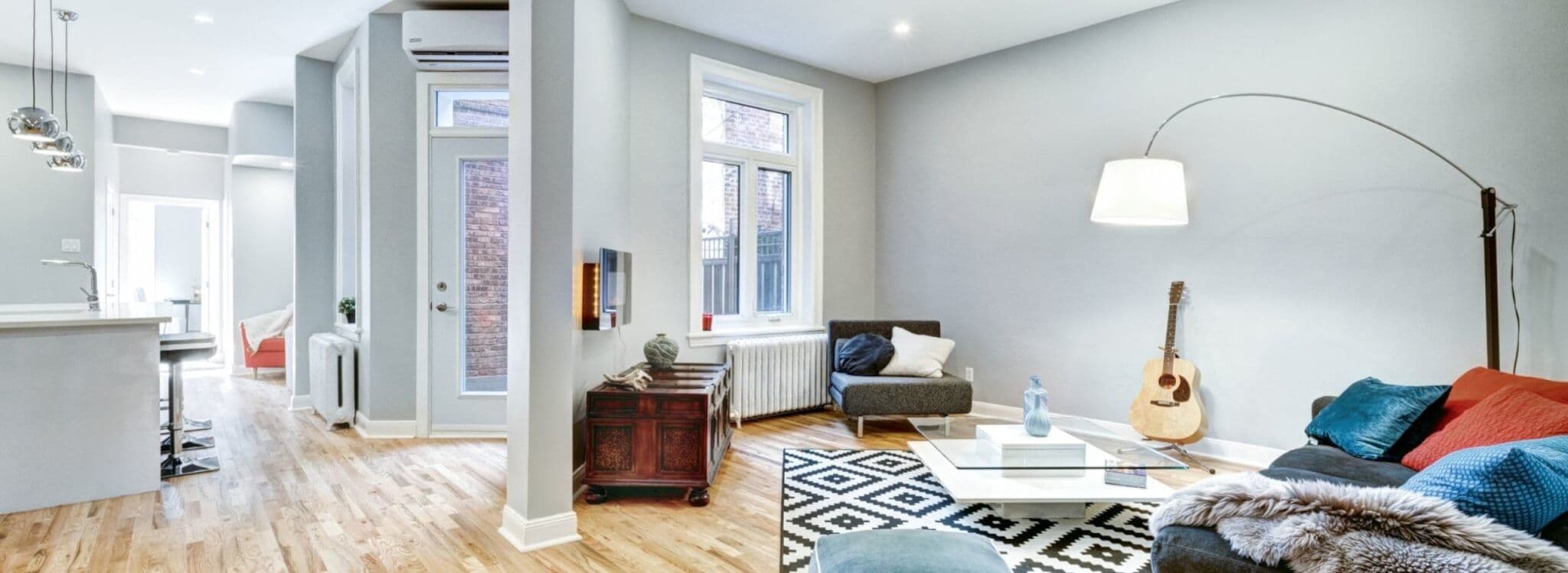10 Investment Property Loans and Financing Alternatives

In a healthy housing market, investing in real estate can be a great decision if you’re looking to make some extra money. Not only can it provide a passive income stream but it also allows you to retain ownership of a property that may appreciate in the future.
However, it’s wise to do your homework before investing in a property to avoid losing money. Below, we’ll cover different types of loans for financing investment properties, rental properties, and second homes so that you know what to look for in a property and a financing solution.
Perhaps the most important thing to remember is that if you’re looking for quick cash, a long-term investment property might not be your best bet; it can take years to see a positive return on your investment. Plus, if you don’t plan on maintaining the property yourself (experts also recommend setting aside 10–15% of the tenants’ annual rent amount for upkeep), you’ll also need to consider the costs of outsourcing property management, which ranges from $80–$100 on average per month. That’s in addition to your down payment and interest, property taxes, insurance, and utilities if you’re covering them for the tenant.
For a $100,000 rental property, for example, be prepared to spend $30,000 or more — that's just for closing costs and pre-rental repairs A simple and common way to evaluate a potential rental property is known as the “one percent rule.” This states that if the gross monthly rent — prior to expenses — earned from the property is equivalent to at least one percent of the purchase price, it’s an opportunity worth exploring.
Fortunately, if you’re wondering how to get a loan for an investment property, you have options. Whether you're eyeing a single-family home, a multi-unit space or a charming vacation rental, there's a financing option out there suited to your needs. There are conventional loans, FHA multi-unit financing, VA loans, portfolio loans, and even LLC-based alternatives, with each carrying its own benefits and drawbacks. Here are some of the best loans and financing alternatives for financing investment properties that we’ll cover in the article below:
- Conventional Bank Loans for Investment Properties
- HELOC investment Property Loans
- FHA Multi-unit Financing
- VA Multi-unit Financing for Investment Properties
- Portfolio Loans for Investment Properties
- LLC Loans for Investment Properties
- Fix-and-flip loans for Investment Properties
- Home Equity Loans for Investment Properties
- Cash-out refinances for Investment Properties
- Home Equity Investments for Investment Properties
- Renovation Loans for Investment Properties
Types of Investment Property Loans and Other Financing Solutions
Conventional Bank Loans for Investment Properties
Although the details may vary depending on the lender, regular loans can be utilized as a means to finance rental properties. Opting for a conventional loan for investment purposes can come with several advantages, such as attractive interest rates and lower costs. Traditional lenders also offer the option to obtain multiple mortgages, although there might be a limit imposed. Nevertheless, it is important to note that investment properties usually require a substantial down payment, typically ranging from 15% to 25%. Additionally, your personal credit history and credit score play a significant role in determining your eligibility for loan approval.
HELOC Investment Property Loans
There are two ways to use a line of credit that can often get confused. First, there’s a traditional Home Equity Line of Credit (HELOC) that can be used on owner-occupied homes. A HELOC allows you to borrow against the equity in your primary residence or another investment property. This type of loan can be a flexible option for financing an investment property, as it allows you to access funds as needed and only pay interest on the amount you borrow. However, it's important to note that the interest rates on HELOCs can be variable and may increase over time. You also run the risk of your lender freezing your HELOC if your credit score or home value declines. The second product is an Investment Property Line of Credit. This allows real estate investors to access funds for purchasing, renovating, or managing investment properties, and has very similar attributes to a traditional HELOC.
FHA Multi-unit Financing
FHA loans for investment properties are backed by the Federal Housing Administration and can be used for new construction, purchases, and gut rehabs of existing properties. Unlike traditional loans, this financing option may only require a 3.5% down payment and may be a possibility for potential owners or first-time investors with a lower credit score than needed for a traditional loan. The catch? To qualify for an FHA loan for an investment property, you are required to reside in one of the units for at least a year.
This requirement may seem like a drawback for some investors, but it can actually be a great opportunity. By living in one of the units, you can closely monitor the property and address any issues that may arise. Additionally, this can help you save money on rent or mortgage payments while you establish your investment property.
VA Multi-unit Financing for Investment Properties
If you’re an active-duty service member, veteran, or spouse, you may qualify for a VA loan for an investment property. Mortgage brokers and conventional lenders offer zero down payments, no mortgage insurance, and flexible credit score requirements, making it a prime option for those looking to build their real estate portfolio and passive income without breaking the bank.
While the down payment and mortgage insurance requirements are waived, be prepared to demonstrate financial stability through cash reserves. Lenders may want to see evidence of your availability to cover potential expenses for several months, ensuring your investment journey runs smoothly. Like the FHA loan, you must reside in one of them to be eligible and may be required to have cash reserves to cover several months of expenses.
Portfolio Loans for Investment Properties
Portfolio loans open the door to tailored financing for your investment property. Offered by private lenders like community banks, credit unions, or mortgage brokers, these loans break free from the restrictions of the secondary market.offered by private lenders, who may be community banks or credit unions, or mortgage brokers. They may be attractive due to their flexibility on term, down payment, and length, and interest rate along with their relatively lenient requirements. On the other hand, this lenient criteria often means that borrowers may have to stomach higher interest rates, higher fees, prepayment penalties, and even balloon payments; this means that you’ll have the full balance to pay at the end of the short-term loan.
For seasoned investors with strong financials, the potential flexibility and customized terms might be worth the extra cost. Others may find solace in the fixed interest rates, offering predictability in an ever-changing market. And for those looking to leverage existing equity, portfolio loans can unlock your home's potential through cash-out refinancing, turning bricks and mortar into liquid capital.
LLC Loans for Investment Properties
The landscape of investment property financing may be dominated by conventional mortgages, but discerning investors often opt for a more flexible approach: LLC loans for investment properties. Unlike traditional loans made to you personally, these financial shields are secured by your limited liability company (LLC), protecting your personal assets from potential lawsuits or disputes stemming from your investment property.
Why choose an LLC loan over other investment property loan options? They offer the chance to establish business credit for your LLC, potentially unlocking future financing opportunities at better rates. Moreover, start-up costs and borrowing costs associated with forming an LLC pale in comparison to the long-term protection it provides.
You may have heard of an LLC loan for an investment property, but it’s a bit different from other options, since it’s technically a loan to the LLC and not to you personally. Many real estate investors finance rental properties under an LLC in order to limit personal liability, establish business credit, and increase protection from lawsuits or disputes. While the process is fairly straightforward — complete the easy steps to set up an LLC, and apply for a mortgage — you will first need to establish business credit history for lenders to evaluate, which can be time consuming if you’re hoping to finance an investment property quickly.
Fix and Flip Loans for Investment Properties
Also known as a “hard money” loan, these specialized fix-and-flip loans typically come with short terms (a few years or less), interest rates that average 10–15%, and points. One advantage is that there aren’t as many restrictions or hurdles to deal with as traditional loans; lenders also may determine the amount you can borrow by looking at the home’s after-repaired value.
Home Equity Loan for Investment Properties
A home equity loan allows you to tap into your equity to fund an investment property, and has the advantage of a fixed interest rate that is usually lower than that of a personal loan. By using a home equity loan for a second home, you’re essentially taking out a second mortgage, so it will have established, predictable rules for paying it back at the end of the term. Most home equity loans have a loan to value (LTV) maximum of 80-85%.
Cash-out Refinances for Investment Properties
A cash-out refinance of your current mortgage may give you the opportunity to fund an investment property and simultaneously secure a lower interest rate on your mortgage. Depending on the length of the mortgage you choose, however, you’re also possibly lengthening your payoff timeline. You’re also still stuck with a lengthy application and approval process and closing, origination, and possibly even appraisal fees.
Home Equity Investments for Investment Properties
Have you ever considered using the equity in your home to buy an investment property? Unlike a loan, a home equity investment (HEI) from Hometap doesn’t come with any interest or monthly payments. And because it isn’t a loan, it doesn’t impact a homeowner’s debt-to-income ratio. The loan-to-value (LTV) maximum is 75%, which means you must have at least 25% equity in the home. The effective period of an HEI is 10 years, which means you need to settle the Investment within 10 years through a refinance, buyout with savings, sale of your home, or with an investment increase.
Frequently Asked Questions About Investment Property Loans
Can I get a home equity loan on an investment property?
Yes, you can. While you’ll be paying interest on the loan, the rates are usually fixed — and often lower than a traditional personal loan.
Is it smart to use a HELOC for investment property?
While the right home financing solution for you depends on your own situation and goals, a home equity line of credit (HELOC) can be a good choice if you’re looking for flexibility in terms of how much money you can access and how often. However, the variable rate can present challenges if you’re seeking a predictable monthly payment.
How much can I borrow against my investment property?
The amount you can borrow against your investment property varies by lender, but a typical maximum is about 80% of your home’s value.
Can you have a HELOC on a rental property?
Yes, you can. This solution has the advantage of allowing you to borrow against your investment or rental property and pulling out cash as you need it.
Can you cash out on equity from an investment property?
Yes, you can, and the process works the same as a cash-out refinance on your primary residence. Like a refi on your own home, you may be able to lock in a lower interest rate on your investment property’s mortgage as well.
Learn how the BRRRR method of real estate investing uses refinancing to fund properties >>
Can you use a renovation loan for an investment property?
You may find it challenging to find a renovation loan for rental properties, because they tend to require the property to be owner-occupied. But that doesn’t mean there aren’t exceptions. There are cases where FHA 203(k) loans, HomeStyle Renovation mortgages, private lender loans, and commercial renovation loans can be the right solution, pending some restrictions. You will need to check with each lender for specific guidelines.
If you’re in the market for a rental property loan, investment property HELOC, or financing alternative for a second home, start by determining what your funding needs are and what you might qualify for. Then start running the numbers to find the loan or investment solution that works for you.
Tap into your equity with no monthly payments. See if you prequalify for a Hometap investment in less than 30 seconds.
You should know
We do our best to make sure that the information in this post is as accurate as possible as of the date it is published, but things change quickly sometimes. Hometap does not endorse or monitor any linked websites. Individual situations differ, so consult your own finance, tax or legal professional to determine what makes sense for you.




